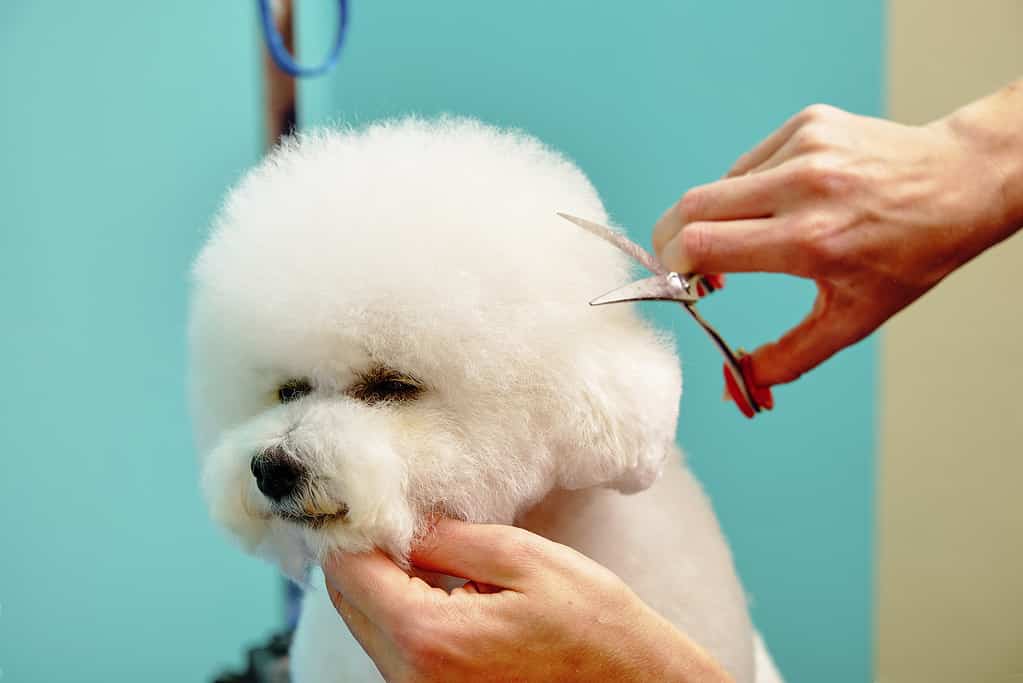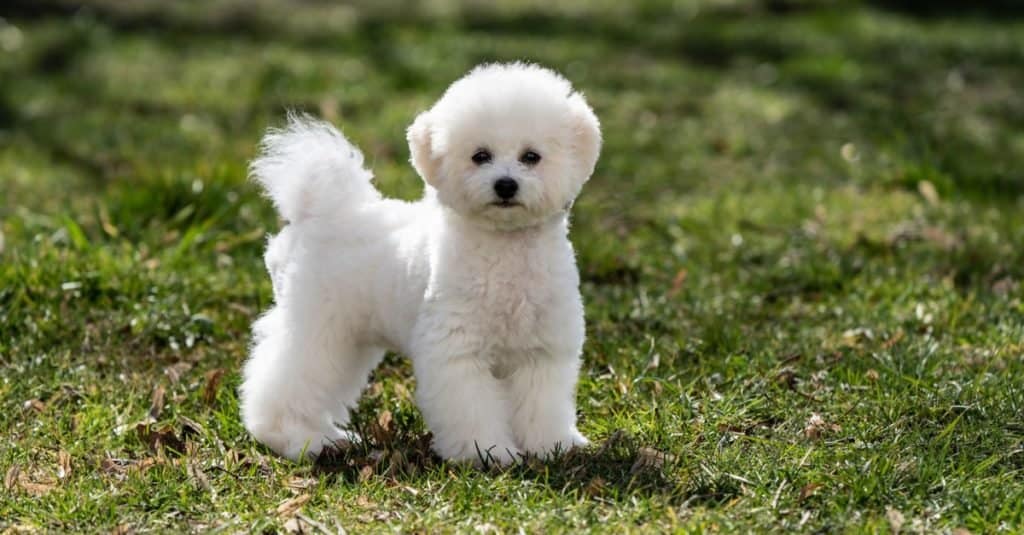The Bichon Frise is among the most popular small dog breeds for many reasons. They are highly intelligent, loyal, fun-loving, and affectionate. However, the breed isn’t ideal for everyone, and there are several common complaints and issues you should know about the Bichon Frise before bringing one into your home. Read on to learn all about these 7 common complaints and, if possible, how you should handle them.
1. Bichon Frises Require High-Maintenance Grooming

To achieve Bichon Frise’s trademark “show cut” style, some very particular and sometimes costly grooming is necessary.
©iStock.com/Ihar Halavach
Perhaps the most well-known trait of the Bichon Frise breed is its white, soft, and puffy-looking coat. But this coat doesn’t just assume an adorable puffball shape naturally. The breed’s coat is naturally wavy-to-curly and can be groomed in various fancy cuts and styles. Known as the “show cut,” the most common haircut for the breed will generally require a trip to an experienced groomer every 3 to 6 weeks. Other slightly lower-maintenance hairstyles include the lamb or puppy cut, the utility cut, and the panda cut.
In addition to regular haircuts, you’ll need to brush your pup’s coat daily with a slicker brush and metal comb and bathe them every 3 weeks. Fortunately, their gorgeous coats are non-shedding and hypoallergenic. This somewhat helps to mitigate their otherwise high-maintenance grooming needs. Just be aware that your Bichon Frise will require some intensive grooming to look and feel their best!
2. Bichon Frises Are Prone to a Variety of Health Conditions

©Ljupco Smokovski/Shutterstock.com
Like many purebred dogs, the Bichon Frise is unfortunately prone to several illnesses, diseases, and health conditions. These can be costly to diagnose and treat. You’ll need to accommodate your dog properly so they can thrive if they have one or more of these conditions.
Some of the most common health issues Bichon Frises deal with include:
- Hip dysplasia: A deformity of your dog’s hips while growing. The hip ball and socket do not grow at the same rate while your dog is a puppy.
- Cataracts: A condition of the eyes that affects vision and causes the eyes to become cloudy.
- Diabetes: A condition where your dog’s body does not use glucose as it should.
- Skin Conditions: Common conditions include atopy, which causes excessive itchiness, and sebaceous cysts, small sack-shaped growths that can be benign or cancerous.
- Patellar Luxation: This condition occurs when your dog’s kneecap slides out of place and dislocates.
- Heart Disease: This can cause pain, an enlarged heart, and difficulty breathing.
- Cancer: The most common variety in Bichon Frises is hemangiosarcoma, a tumor that develops from the cells that typically create blood vessels.
Taking your Bichon Frise to an experienced, reputable veterinarian regularly (at least once or twice a year) can help prevent and catch these conditions early.
3. Bichon Frises Are Prone to Separation Anxiety

The Bichon Frise is breed is incredibly loyal, but separation anxiety is very common.
©iStock.com/SStajic
Another common complaint many Bichon Frise owners mention is the breed’s clinginess and tendency to become anxious when separated from their favorite people. To be clear, Bichon Frises are incredibly loyal and loving. However, this becomes a double-edged sword when it’s time for you to go to work, run errands, or simply have a social life of your own.
Fortunately, there are a number of ways you can ease your dog’s separation anxiety. These include:
- Provide your dog with engaging, long-lasting chew toys to keep them busy
- Take your dog for a walk or play with them for at least 30 minutes before leaving the house
- Crate training
- Independence training
- Leave behind a shirt or item that smells like you to comfort your dog
- Do not make a big deal or fuss when entering or leaving the home; keep greetings short
4. Bichon Frises Can Be Difficult to Housebreak

In some cases, it may take up to a year for your Bichon Frise pup to become fully housetrained. Be sure to start early and be consistent.
©Ermolaev Alexander/Shutterstock.com
As with many small dog breeds, the difficulty of housebreaking the Bichon Frise is a common complaint. This is mainly because small breeds have higher metabolisms yet smaller bladders than larger dogs. Here are some tips for the housetraining process with your pup:
- Stick to a strict routine. Changing your routine frequently can add confusion and make it harder for your dog to pick up on where and when they are supposed to “go.”
- Take your dog out often, particularly early in the morning and after naps, playtime, and meals.
- Have patience, especially if your dog is still a puppy. It can take anywhere from four months to a year to properly housetrain your dog.
- Pay attention to your dog’s body language for signs they have to go. Squatting and circling, nervous fidgeting, and sniffing the floor or ground can all be your dog’s way of showing you they need to potty.
5. Bichon Frises Can Be Shy and Difficult to Socialize

A common issue with Bichon Frises is their tendency to be challenging to socialize.
©Mladen Mitrinovic/Shutterstock.com
While Bichon Frises are extremely loyal, this can be an issue as it can double as clinginess. Additionally, many Bichon Frises are highly intelligent and can have a bit of an independent streak. This can make them a bit of a challenge to socialize with other people and pets. Fortunately, we also have some tips for this process, too:
- Start with brief, calm, quiet, one-on-one interactions with others.
- Make the process rewarding by offering a treat to your dog after a successful interaction.
- Take your dog on as many outings as possible as they become comfortable enough.
- Introduce your dog to a variety of different types of people, i.e. different ages, races, sizes, and genders.
6. Bichon Frises Are High-Energy and Require Lots of Exercise

It’s important to make sure your Bichon Frise gets plenty of exercise.
©Ieva Tvaronavicute/Shutterstock.com
If you live a more laid-back, sedentary lifestyle, the Bichon Frise’s high-energy, fun-loving temperament might be a bit of a challenge for you. Ideally, your dog should be getting at least 30 minutes to an hour of exercise per day. This can be in the form of walks, playtime, or even interactive training-based games to keep your dog’s mind and body healthy.
Additionally, by keeping your dog active, you can minimize their restlessness and predisposition to separation anxiety. Furthermore, you can prevent obesity and keep your dog’s heart healthy, too.
7. Bichon Frises Can Be Expensive

Bichon Frise puppies can be quite expensive, but you may be able to adopt one from a shelter or rescue.
©iStock.com/Chiemi Kumitani
Perhaps the most costly common complaint noted by Bichon Frise owners is the initial cost of the dog breed itself. Although prices vary widely depending on where you live, the cost of a Bichon Frise puppy can range from $1,000 to $3,000. This is mainly due to the rarity of Bichon Frise breeders.
Alternatively, if you’re lucky enough, you may be able to adopt one from a shelter or rescue. Consider contacting groups like the Bichon Rescue Brigade or the Bichon Frise Club of America Charitable Trust.
The photo featured at the top of this post is © Ljupco Smokovski/Shutterstock.com
Ready to discover the top 10 cutest dog breeds in the entire world?
How about the fastest dogs, the largest dogs and those that are -- quite frankly -- just the kindest dogs on the planet? Each day, AZ Animals sends out lists just like this to our thousands of email subscribers. And the best part? It's FREE. Join today by entering your email below.
Thank you for reading! Have some feedback for us? Contact the AZ Animals editorial team.






